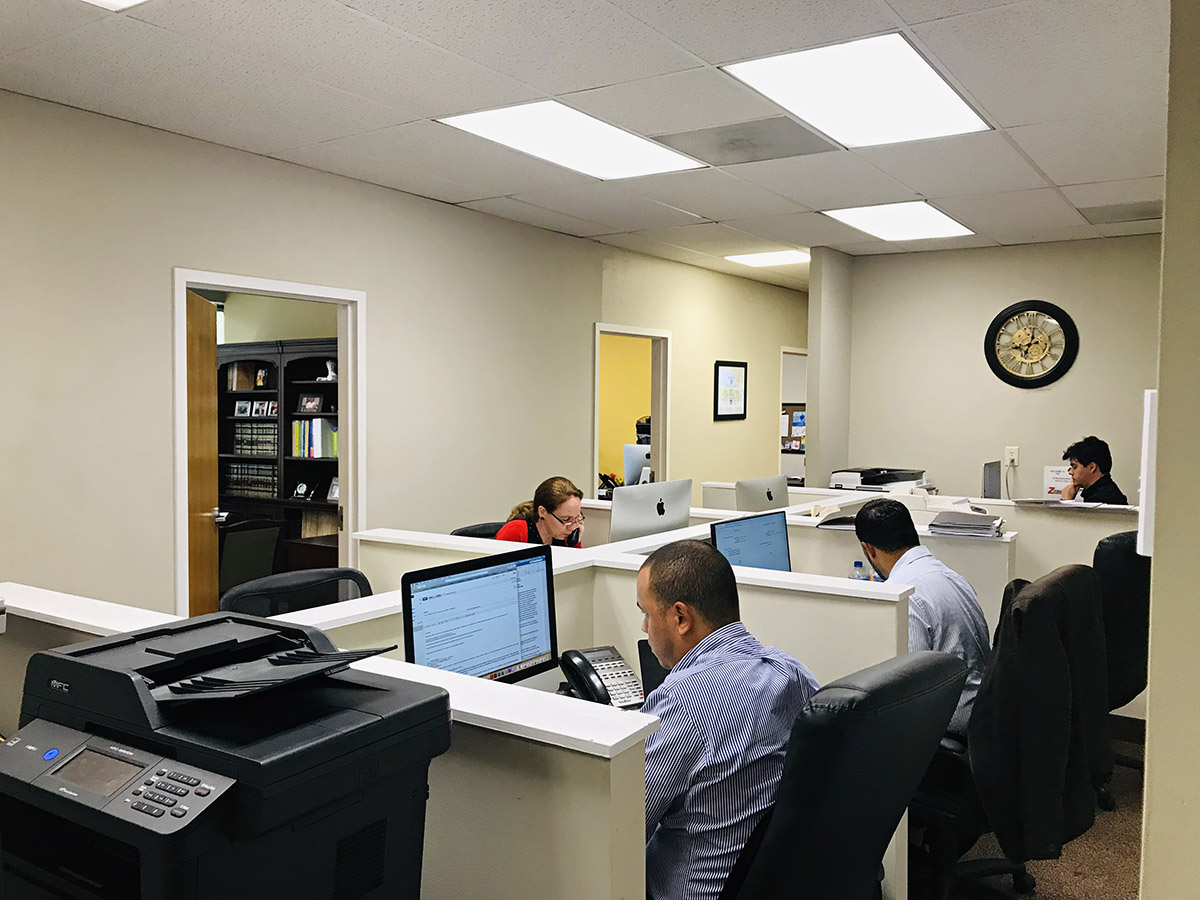Home>Garden Essentials>How To Get A License For Landscaping


Garden Essentials
How To Get A License For Landscaping
Modified: March 7, 2024
Learn how to obtain a garden landscaping license and start your dream career in the green industry. Get all the required information and steps in this comprehensive guide.
(Many of the links in this article redirect to a specific reviewed product. Your purchase of these products through affiliate links helps to generate commission for Storables.com, at no extra cost. Learn more)
Introduction
Welcome to the world of landscaping! If you have a passion for plants, a keen eye for design, and a desire to create beautiful outdoor spaces, then pursuing a career in landscaping might be the perfect fit for you. Whether you aspire to become a professional landscaper or simply want to enhance your gardening skills, obtaining a license is a crucial step towards achieving your goals.
A license not only demonstrates your expertise and qualifications, but it also opens up a world of opportunities in the field of landscaping. It allows you to take on more significant projects, work with reputable clients, and establish yourself as a trusted professional in the industry. Plus, it increases your credibility and trustworthiness in the eyes of potential clients.
While the process of obtaining a landscaping license may seem daunting at first, by breaking it down into manageable steps, you’ll be well on your way to achieving your goal. In this article, we will guide you through the necessary steps to obtain a licensing for landscaping and provide you with invaluable tips along the way.
So, let’s dive in and explore the journey to becoming a licensed landscaping professional!
Key Takeaways:
- Becoming a licensed landscaper involves researching requirements, completing education, gaining work experience, preparing documents, passing an exam, and renewing the license regularly. It’s a journey worth embracing!
- A landscaping license opens doors to a fulfilling career. It showcases expertise, professionalism, and commitment to creating beautiful outdoor spaces. Embrace the challenges and enjoy the journey!
Read more: How To Get A Landscape Design License
Step 1: Research the Requirements
The first step in obtaining a license for landscaping is to thoroughly research the requirements set by your local governing body or licensing board. The specific requirements may vary depending on your location, so it’s essential to gather accurate and up-to-date information.
Start by visiting the website of your state’s licensing board or contacting the appropriate authorities. Look for information on the qualifications, exams, fees, and any other prerequisites necessary to obtain a landscaping license. Take note of any educational or experiential requirements that may be required.
It’s important to gather as much information as possible to avoid any surprises or delays in the licensing process. Some common requirements that you may come across during your research include:
- Minimum age requirements
- Proof of legal residency or work authorization
- Evidence of educational qualifications or training
- Work experience in the landscaping industry
- Proof of liability insurance
- Passing a background check
- Passing a licensing examination
By understanding the requirements in detail, you can start planning and preparing for the next steps in the licensing process. It’s also a good idea to seek advice or guidance from professionals already working in the landscaping industry or organizations that specialize in licensing information. They can provide valuable insights and answer any specific questions you may have.
Once you have gathered all the necessary information and have a clear understanding of the requirements, you can proceed to the next step with confidence.
Step 2: Complete the Required Education or Training
After conducting thorough research on the requirements for obtaining a landscaping license, you may discover that certain educational or training requirements need to be fulfilled. These requirements are put in place to ensure that you have the necessary knowledge and skills to work as a professional landscaper.
Start by determining if there are any specific educational programs or courses that you need to complete. Look for accredited institutions or organizations that offer programs focused on landscaping, horticulture, or landscape design. These programs can provide you with in-depth knowledge of plant identification, soil composition, irrigation systems, landscape architecture, and more.
Consider enrolling in a certificate or degree program that aligns with your career goals and the requirements set by your local licensing board. These programs not only provide you with the foundational knowledge but may also offer practical hands-on experience through internships or apprenticeships.
If you’re already working in the landscaping industry but lack formal education, don’t worry. Many licensing boards accept equivalent work experience in place of formal education. Check with your local board to see if you can qualify based on your years of experience in the field.
Additionally, attending workshops, seminars, or conferences related to landscaping can also be beneficial. These events often provide valuable insights, new techniques, and industry updates that can enhance your skills and keep you up to date with the latest trends in the field.
Remember, gaining knowledge and expertise in landscaping is an ongoing process. Continuing education can help you stay ahead of the game and provide you with a competitive edge.
Once you have completed the required education or training, make sure to obtain the necessary documentation as proof. These documents will be essential during the application process to demonstrate that you have met the educational requirements set by the licensing board.
Now that you have fulfilled the educational requirements, you are one step closer to obtaining your landscaping license. The next step involves gaining relevant work experience, which we will explore in the following section.
Step 3: Obtain Relevant Work Experience
Obtaining relevant work experience is a crucial step in the process of obtaining a landscaping license. This step not only provides you with hands-on practical knowledge but also demonstrates to licensing boards that you have the necessary skills to work in the field.
Start by seeking employment or internships with established landscaping companies or professionals in your area. This will allow you to learn from experienced landscapers and gain exposure to a variety of projects and client needs. Working under the guidance of seasoned professionals can provide invaluable mentorship and help you develop skills such as plant selection, irrigation system installation, landscape design, and project management.
It’s important to document your work experience and keep track of the projects you have been involved in. Maintain a portfolio or work log that showcases your skills and the successful completion of various landscaping projects. This documentation will be beneficial when you apply for your license, as it demonstrates your practical experience and competence in the field.
If you are unable to find employment, consider volunteering for community or non-profit organizations that focus on landscaping or garden projects. This will not only allow you to gain experience but also provide you with an opportunity to give back to your community.
Networking is also crucial in the landscaping industry. Attend industry conferences, join professional associations, and connect with other landscapers or gardeners in your area. Building relationships with industry professionals will not only enhance your knowledge but may also open doors to new opportunities or potential employment.
Most licensing boards require a minimum number of hours or years of work experience in order to qualify for a license. Make sure to review the requirements set by your local board and ensure that you meet the criteria before applying.
By obtaining relevant work experience, you are not only sharpening your skills but also building a solid foundation for your landscaping career. Now that you have gained the necessary work experience, it’s time to prepare the necessary documents and forms for your license application, which will be covered in the next step.
Step 4: Prepare Necessary Documents and Forms
Now that you have completed the required education and obtained relevant work experience, it’s time to prepare the necessary documents and forms for your landscaping license application. This step requires attention to detail and careful organization to ensure a smooth process.
Start by reviewing the application requirements provided by your local licensing board. Take note of all the documents and forms that need to be submitted and ensure that you have them readily available.
Some common documents and forms that may be required include:
- Completed license application form
- Proof of identification (such as a copy of your driver’s license or passport)
- Evidence of legal residency or work authorization
- Official transcript or certificate of completion from your educational program
- Proof of work experience (such as a portfolio or work log)
- Letters of recommendation from employers or industry professionals
- Proof of liability insurance
- Proof of passing a background check
It’s crucial to ensure that all documents are up to date, accurate, and properly prepared according to the requirements set by the licensing board. Any missing or incomplete documents can result in delays in the application process or even rejection of your application.
Additionally, make sure to organize your documents in a clear and concise manner. Use folders or binders to keep everything in order and easily accessible. Label each document accordingly for quick reference during the application process.
Before submitting your application, carefully review all the information and double-check that you have included all the necessary documents. It can be helpful to have a trusted friend or family member review your application as well to catch any potential errors or omissions.
By thoroughly preparing the necessary documents and forms, you are demonstrating your professionalism and attention to detail. Now that your application is ready, it’s time to move on to the next step: submitting the application and paying the required fees.
Research the specific requirements for landscaping licenses in your state, which may include completing a training program, passing an exam, and obtaining liability insurance.
Step 5: Submit Application and Pay Fees
After meticulously preparing all the necessary documents and forms for your landscaping license application, it’s time to take the next step and submit your application to the appropriate licensing board. This step requires careful attention to detail and prompt action to ensure a smooth application process.
Start by reviewing the application guidelines and instructions provided by the licensing board. Make note of any specific submission requirements, such as whether the application needs to be submitted online, in person, or by mail. Follow these guidelines closely to ensure that your application is properly received and processed.
Check if there are any fees associated with the application process. Most licensing boards require applicants to pay a fee to cover administrative costs. Ensure that you have the necessary funds available and be prepared to make the payment in a timely manner. Keep in mind that the application process may be delayed if payment is not received or if the payment method is incorrect.
When submitting your application, make sure to include all the required documents and forms as outlined by the licensing board. Verify that each document is properly filled out, signed, and dated. Any missing or incomplete information may result in a delay or rejection of your application.
It’s a good idea to make copies of all the documents you are submitting for your own records. This will help you keep track of what you’ve submitted and serve as a reference in case any issues arise during the application process.
If you are submitting your application by mail, consider using a certified mail service or requesting a delivery confirmation to ensure that your application is received by the licensing board. This will provide you with peace of mind and a tracking number for your records.
Once your application and fees are submitted, it’s time to patiently wait for the licensing board to review your application. The processing time can vary depending on the volume of applications and the specific requirements of your local board. During this waiting period, you can prepare yourself for the next step: the licensing exam.
By carefully following the submission guidelines and promptly paying the required fees, you are demonstrating your professionalism and commitment to obtaining your landscaping license. Now it’s time to focus on preparing for the licensing exam, which we will explore in the next step.
Step 6: Pass the Licensing Exam
Passing the licensing exam is a crucial step in obtaining your landscaping license. This exam is designed to assess your knowledge and competency in various aspects of landscaping, including plant identification, landscape design principles, irrigation systems, and horticulture practices.
Start by familiarizing yourself with the exam format and content. Check with your local licensing board or exam provider for information on the exam structure and specific topics that will be covered. This will help you tailor your study efforts and focus on the areas that require more attention.
Utilize study materials and resources that are specifically designed for the landscaping licensing exam. These resources may include textbooks, online courses, practice exams, and study guides. Make a study schedule and allocate dedicated time each day to review and study the material.
Consider forming study groups with fellow aspiring landscapers or joining online forums dedicated to landscaping professionals. Discussing concepts and sharing knowledge with others can help you gain a deeper understanding of the subject matter and offer different perspectives.
Take advantage of practical experience and apply your knowledge to real-world scenarios. Engage in hands-on projects, volunteer opportunities, or internships that allow you to practice and reinforce the concepts you have learned. This practical experience will not only enhance your understanding but also prepare you for the application of knowledge in real-life situations.
In addition to studying the technical aspects of landscaping, make sure to familiarize yourself with the local regulations and codes that govern the industry in your area. Understanding the legal and ethical considerations of the profession is essential for a successful career as a licensed landscaper.
On the day of the exam, make sure to arrive early with all the necessary materials, such as identification and any permitted reference materials. Follow the instructions provided by the exam proctors and carefully read each question before answering. If you’re unsure about a particular question, make note of it and come back to it later, focusing on the questions that you feel more confident about first.
Remember to pace yourself during the exam and manage your time wisely. Stay calm and focused throughout the duration of the exam, and trust in your preparation and knowledge.
Once you have completed the exam, patiently wait for the results. If you have passed the exam, congratulations! You are now one step closer to obtaining your landscaping license. If you did not pass, take this as an opportunity to identify areas of weakness and make necessary adjustments in your study approach. You can retake the exam after a certain waiting period, so use this time to further enhance your knowledge and skills.
Passing the licensing exam demonstrates your competence and dedication in the field of landscaping. Now that you have cleared this hurdle, it’s time for the final step: renewing your license regularly.
Step 7: Renew Your License Regularly
Once you have obtained your landscaping license, it’s important to remember that it has an expiration date. Renewing your license regularly is essential to maintain your status as a licensed landscaper and continue practicing legally.
Check with your local licensing board to determine the renewal requirements and deadlines. Most licensing boards require licensees to renew their licenses every one to three years, depending on the jurisdiction. Make note of the specific documents or fees that may be required for the renewal process.
Stay updated on any changes in regulations or industry practices that may affect the renewal of your license. It’s crucial to stay informed and comply with any new requirements set by the licensing board.
Continuing education is often a requirement for license renewal in many jurisdictions. This may involve completing a certain number of hours of approved training or attending workshops and seminars to enhance your knowledge and skills. Stay engaged in professional development opportunities to ensure your license renewal goes smoothly.
As the renewal deadline approaches, make sure to gather all the necessary documents and forms required for renewal. This may include proof of completing the required continuing education, evidence of liability insurance, or any other documentation requested by the licensing board.
Submit your renewal application and fees according to the instructions provided by the licensing board. Ensure that you meet the deadlines and adhere to any specific submission guidelines to avoid any lapses in your licensing status.
Keep track of your licensing renewal dates and set reminders in advance to ensure you don’t miss the deadline. Plan ahead and start the renewal process early to allow yourself ample time to gather all the necessary documents and complete any required training.
By renewing your license regularly, you demonstrate your commitment to professionalism and staying current in the field of landscaping. It also ensures that you are in compliance with local regulations and can continue providing your services with confidence.
Congratulations on completing all the steps necessary to obtain and renew your landscaping license! By following these steps, you have positioned yourself as a qualified and licensed professional in the field of landscaping. Continue to stay updated on industry trends, enhance your skills, and deliver exceptional results to clients to thrive in your landscaping career.
Best of luck on your journey as a licensed landscaper!
Conclusion
Obtaining a landscaping license is a significant accomplishment that opens up doors to a fulfilling career in the field of landscaping. It demonstrates your expertise, professionalism, and commitment to the industry. Through the seven steps outlined in this article, you can navigate the licensing process with confidence and successfully attain your license.
From researching the requirements to completing the necessary education and training, to obtaining relevant work experience, and preparing the required documents and forms, each step plays a crucial role in reaching your goal. By investing time, effort, and dedication into each step, you are laying the foundation for a successful career as a licensed landscaper.
Passing the licensing exam is a testament to your knowledge and skills in the field of landscaping. It proves that you have the necessary expertise to design and create beautiful outdoor spaces, implement sustainable practices, and maintain landscapes effectively.
Remember, the journey doesn’t end once you obtain your license. Regularly renewing your license and staying informed about industry updates and regulations is vital for maintaining your licensing status and continuing to excel in your career.
As a licensed landscaper, you have the opportunity to transform outdoor spaces, enhance the beauty of nature, and create inviting environments for clients. Your expertise will be sought after and valued by homeowners, businesses, and communities.
So, embrace the journey, embrace the challenges, and embrace the joy of creating captivating and sustainable landscapes as a licensed landscaper. Your dedication to the craft will not only make a positive impact on the environment but also bring beauty and inspiration to the lives of many.
Congratulations on taking the steps to become a licensed landscaper, and best of luck in your future endeavors!
Frequently Asked Questions about How To Get A License For Landscaping
Was this page helpful?
At Storables.com, we guarantee accurate and reliable information. Our content, validated by Expert Board Contributors, is crafted following stringent Editorial Policies. We're committed to providing you with well-researched, expert-backed insights for all your informational needs.















0 thoughts on “How To Get A License For Landscaping”